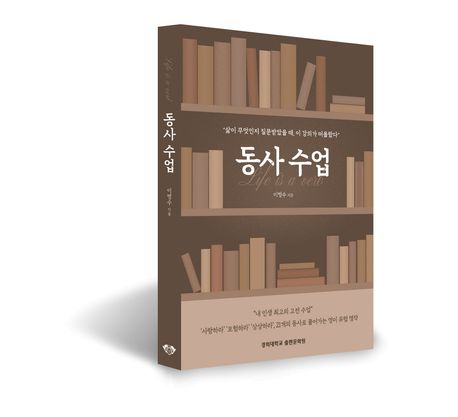[Feature] Living by Verbs: Life Lessons from the Classics
On January 30, professor Lee Byung soo, a faculty member of the Humanitas College at Kyung Hee University (KHU), published a new book titled Verb Lesson. The book offers an overview of prominent classics from Anglo-American and European traditions, ex plaining the main messages of each work. Furthermore, prof. Lee focuses on verbs to de scribe behavior, which he con siders to be the primary driver in life, rather than focusing on nouns. The book was published by KHU Communication & Press.

Verb Lesson
Photo: Kyobo Book (kyobobook.co.kr)
Background of the Publication
Prof. Lee gives humanities lectures both within and out side KHU. As a professor at KHU’s Humanitas College, he teaches courses on Human Quest for Values and European Culture and the Civilization of Cities. Additionally, he has conducted lectures at the Sunkyung Library, where he engages students in reading classics and sharing their insights. Prof. Lee noted that the student’s requests were a key motivation for writing this book. He explained, “I wrote this book not only to explore the meaning and significance of classics but also to share the impressions they convey with readers.” He added, “Having studied classic literature with my students for many years, I wanted to share more con text and insights that time constraints prevented us from fully addressing in class.” In particular, he was deeply motivated by a student’s story after passing a job interview, which reinforced his belief that classics can enrich people’s lives. He wrote the book with the hope that readers would independently explore the themes, contexts, and characters in these classics and reflect on their own lives.

Professor Lee Byung-soo, a faculty member of the Humanitas College at Kyung Hee University
Photo: mblogthumb-phinf.pstatic.net
The Themes of Classics Explored Through Keywords
The book introduces 21 classics classified under five keywords: “Empathy”, “Imagination”, “Action”, “Expression”, and “Passion”. Each keyword is further explored through four to five specific verbs. For example, the theme of “Empathy”, represented by the verb “Love”, explores Plato’s Symposium, the theme of “Imagination”, tied to “Dream”, delves into Ernest Hemingway’s The Old Man and the Sea; and the theme of “Action”, linked to “Explore”, examines Antoine de Saint-Exupéry’s Night Flight. Prof. Lee explained his intention for this structure, stating, “As classic masterpieces encompass diverse messages, I chose the theme for each chapter with the hope that readers would focus on a single theme while reading.” He also observed that conventional books often center on nouns, dwelling on questions of existence, spirit, and soul. However, he emphasized that life gains continuity not merely through thought but through physical action, highlighting the importance of practical, verb-based language as the foundation for this structure.
As such, the book has a unique structure that tries to convey the messages of the classics through the action of the main figures. For example, it effectively conveys the story of Franz Kafka’s The Metamorphosis by describing the action of Gregor. One day, Gregor dis covers that his appearance has changed into an insect. However, even though his appearance has changed, he still has his consciousness, ability to think, and capacity for empathy. In the story, he communicates with his younger sister while hiding his appearance. They share feelings of sympathy and sad ness with each other. Though transformed into an insect, he still considers himself to be a human, capable of understanding language and feeling empathy. Trusting his younger sister, who understands his heart, will accept him as a human despite his altered appearance. He eventually reveals himself to her. The book gives a message to the readers through the verb “Hear”. Even in his insect form, he is still able to understand the language and feel the emotion. As such, the book poses a question and motivates readers to think independently: What makes us a human?

Franz Kafka’s The Metamorphosis
Photo: Biblioklept (biblioklept.org)
Investigating Life Through Classic Literature
Prof. Lee argued that under standing behavior is the key element to investigating life. He mentioned, “As depicted by authors, what matters to us is not failure or success but the act itself. Only action awakens the truth of life and propels us forward.” He further explained that he composed the book to explore the meaning of verbs, which express action as the driving force of life, enabling readers to interpret their own lives. He added, “All human endeavors begin with action. Do not confine yourself to a narrow space. Put yourself into the broader sea of life. What moves the ship is ultimately the verb. To grasp the essence of life, action is more import ant than thought.”
Prof. Lee also underscored the importance of classics in people’s lives. He stated, “Classics are a treasure trove of wisdom accumulated by humanity. These masterpieces depict ideas, nature, human experiences, social contexts, and di verse characters. They address the joys and sorrows of human life, guiding us toward the right path in the present.” He encouraged readers, “Always cherish books, keep them close, and read them. I am confident that those who discover the joy of reading classics will be led to enriched and fulfilling lives.”
The book effectively conveys the messages of classics by introducing them with relevant verbs. Moreover, it offers readers an opportuni ty to deeply understand the meaning of behavior. Prof. Lee’s Verb Lesson is expected to provide an accessible ap proach to classic literature, by encouraging readers to reflect on their own lives. Through vivid explanations and re latable examples, the book bridges the gap between time less literature and modern experiences, making classical wisdom more personal and relevant. It not only promotes literary appreciation but also inspires thoughtful intro spection, which helps readers recognize how language, ac tion, and intention are closely intertwined in shaping one’s character and behavior
There are no registered comments.
I agree to the collection of personal information. [view]

